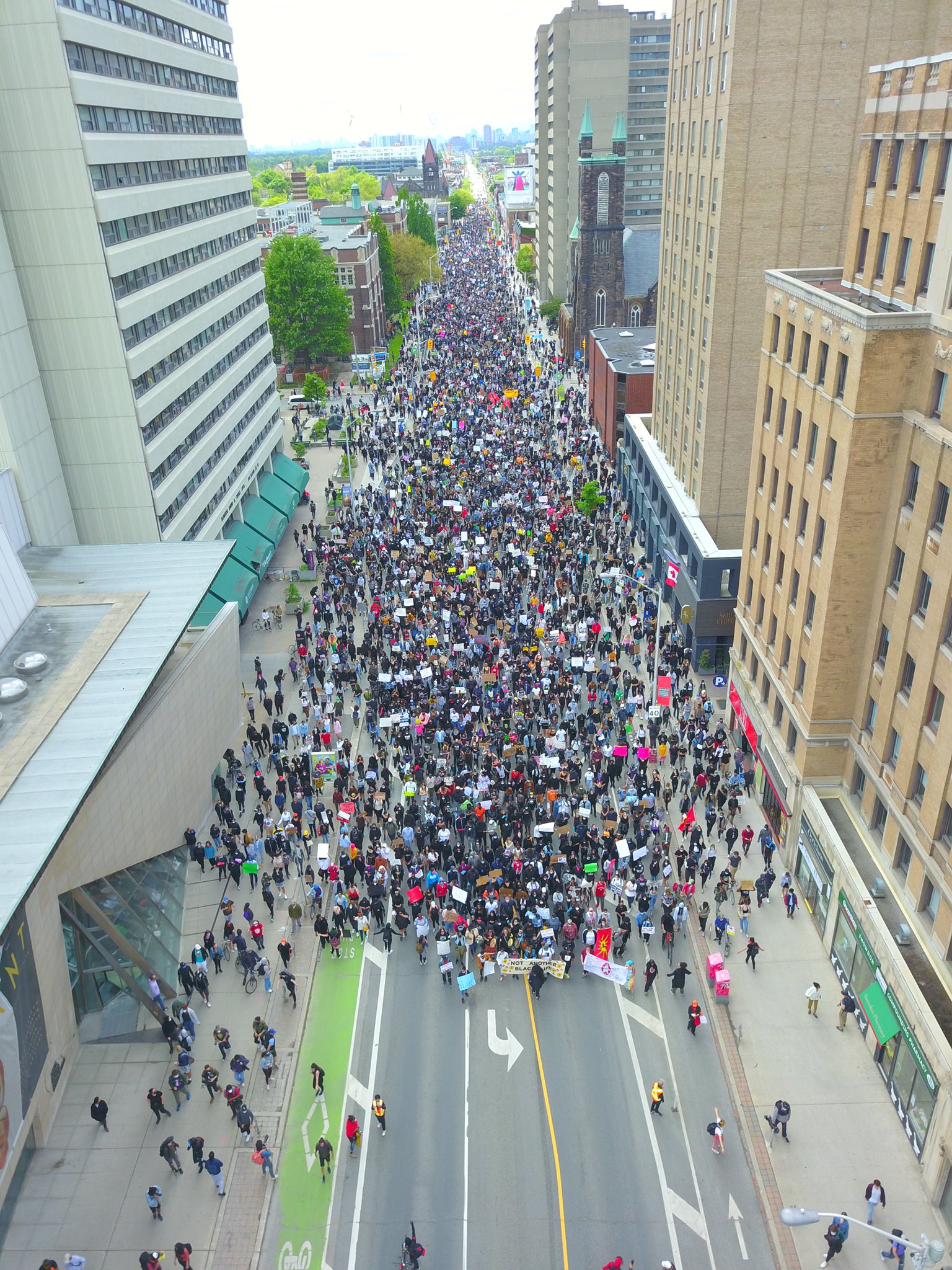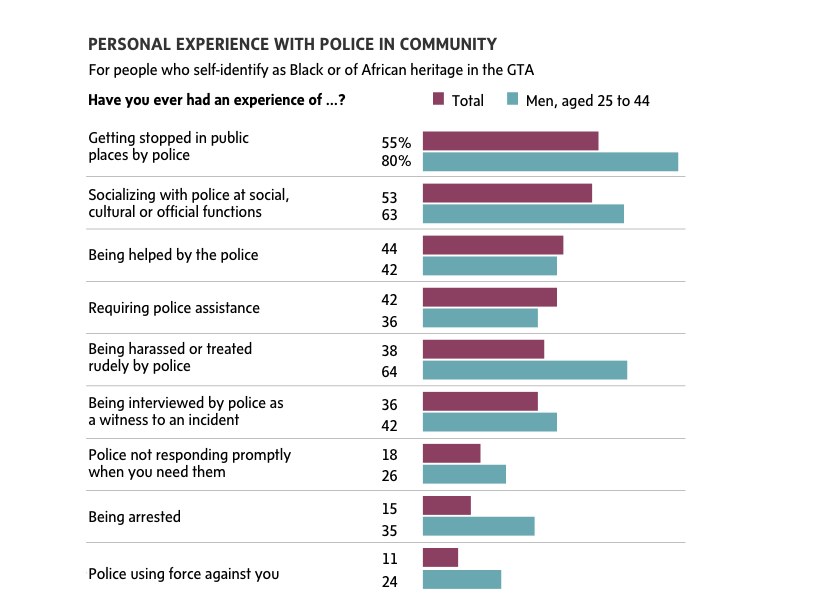The two weeks since the death of George Floyd have been heavy ones for anyone following. We’ve all been tuned to our news and social media sources — seeing protestors, celebrities, allies, everyone — articulate their/our rightful anger over how Black lives have been systemically ignored and undervalued for so long.

But, as Canadians, it’s important to acknowledge that systemic racism and police brutality are not exclusively American problems. We have a lot of work to do in this sphere as well. A border doesn’t stop all systemic issues, and neither does single payer healthcare or a less broken immigration system.
It has also been extremely disappointing seeing the media here focus on asking a binary “is Canada racist? yes/no” question, as opposed to having a nuanced conversation about racism. Whether it’s a National Post op-ed or the premier of the largest province, the discussion has yet to move beyond that simple question with an obvious answer, and onto real issues, like how long-asked-for police oversight reforms were shelved in 2018 by that same premier.
I’m writing this post to highlight some things that are broken. I’m not an expert, so the rest of this post is mostly just going to highlight news articles and research done by others. If there’s something big I miss, or if you have any other comments, don’t hesitate to contact me.
The reality of police brutality in Canada
Cases of excessive use of force by police are far from unheard of in Canadian cities. Not only are Black Canadians disproportionately impacted, indigenous and First Nation Canadians are as well.
A study conducted by the Ontario Human Rights Commission concluded that Black Torontonians are 20 (!) times more likely to be shot by police for the same encounters as White Torontonians.
Despite making up only 8.8% of Toronto’s population, data obtained by the Ontario Human Rights Commission (OHRC) from the Special Investigations Unit (SIU) shows that Black people were over-represented in use of force cases (28.8%), shootings (36%), deadly encounters (61.5%) and fatal shootings (70%). Black men make up 4.1% of Toronto’s population, yet were complainants in a quarter of SIU cases alleging sexual assault by TPS officers.
And while Indigenous Canadians make up 4.9% of Canada’s population, they comprise more than 1/3 of all deaths at the hands of the RCMP.
We do our country and our citizens a disservice by pretending this is just an American problem.
Police oversight (in Ontario)
The previous section mentioned Ontario’s Special Investigations Unit (SIU). That’s the civilian oversight body for police forces in the province, in cases involving police-induced injury or death. The body had been long criticized by multiple experts and the general community for a pro-police bias and lack of independence.
The most significant SIU reforms in 25+ years were passed by the province in 2017 after lots of public consultation, only to get halted by a newly elected government in 2018 that claimed they were too anti-police. The new government eventually ended up quietly keeping most of the reforms , though they did reduce fines for police officers, significantly increased the standard of evidence for dismissing officers without pay, and most controversially , added a determination step where police chiefs could sometimes get to choose if the SIU is called. All of these were unilateral requests from police unions.
Other 2017 reforms that got gutted without replacement included a restructuring of the OCPC and OIPRD (two other, non-injury/death related police oversight agencies) that would have increased their mandates to independently investigate all police complaints. Currently, those complaints fall through to police forces themselves.
Maybe the next time Doug Ford talks about how Canada isn’t as racist as the US, someone in the media could ask him a question about his actual actions on police oversight.
What you can do
Write to your Ontario MPP and ask them to reinstate the remainder of Bill 175’s reforms, or to install equivalent ones.
Border Services oversight
The Canada Border Services Agency (CBSA) has long faced accusations of abuse of power and sexual misconduct, all while enjoying an exceptional lack of oversight for the powers they’re bestowed with. After a a high-profile incident of death by tazer at Vancouver International Airport, the agency revamped some of its procedures on its own , but an incident shouldn’t have to be that high-profile to get addressed.
Turns out, there’s a bill lying right at the desks of MPs that aims to solve this. Bill C-3 aims to significantly enhance CBSA oversight. It will restructure the RCMP’s complaints division to also handle (and have equivalent authority in) CBSA complaints. However the government seems to be slacking on getting the bill through; it has only gone through first reading in the House of Commons and has yet to be referred to committee or voted on. A previous version of the same bill had passed the House of Commons in summer 2019, back when the Liberals had a majority, but it didn’t clear the Senate before parliament was dismissed for the 2019 election.
Maybe someone could pose a question about this to Justin Trudeau at his next daily address from Rideau Cottage.
What you can do
Contact your MP and ask them to prioritize passing Bill C-3.
Police funding
Your dollars, Toronto. Can you think of a better use for them? pic.twitter.com/pCl0w34xRS
— Tracey Nolan (@misstraceynolan) June 5, 2020
You’ve probably seen photos like the one above, showing how policing is the largest item in the budgets of most municipalities in Canada. You probably also wrote to your councillor about it. But as it turns out, they can’t do much about it.
In Ontario, provincial legislation requires police budgets to be set by an arms-length police board that is jointly appointed by the relevant municipality(ies) and the province. The budget determined by these boards goes to municipalities for final approval, but politicians there can’t strike down individual budget items, even if they want to. Here’s a recent blog post from an Ottawa councillor about it, and here’s another from a Waterloo Region councillor.
What you can do
Write to your Ontario MPP (or MLA if you’re not in ON and your province has a similar law), and ask them to update provincial legislation to give elected municipal politicians tools to reduce police budgets.
And keep the pressure up on your local councillors to direct some of the police’s funding to transit, social and civic services, recreation programs, housing, public health, parks, and the like. Torontonians can find their councillor here.
Media representation and discourse
Remember Amy Cooper, the Central Park dog lady? Turns out, she was Canadian. She even went to my alma mater, the University of Waterloo.
When Sandy Hudson was called to the CBC to talk about it, this is how her experience went:
1/ The CBC needs more Black producers. And to cut the crap. #BlackLivesMatter#JusticeForRegis
— Sandy Hudson (@sandela) May 29, 2020
I was tapped yesterday to appear on The Current this morning to discuss "George Floyd and Amy Cooper."
When I asked if we would also talk about Regis Korchinski-Paquet, I was told:
Canada’s population is immensely diverse - with its largest city being the most diverse city in the world by many measures . But the country’s cultural and media institutions rarely reflect this diversity.
This isn’t just a token representation problem; it’s actively preventing us from having a nuanced conversation about cultural identity and politics at all, and is also directly harming the Black Lives Matter movement here. Also, Canadians are increasingly turning to alternative, more diverse but less reliable media sources just to address this representation gap, which is both problematic in some ways and a searing criticism of existing media in others.
Just look at how one of the largest newspapers in Canada gave a voice to an old white man to declare the country free of racism. I won’t link the article itself, but I’ll link another one in the same newspaper that points out all its flaws. That (better) article’s author had to withstand quite a bit of hate mail from people who were too, let’s just say, uncomfortable with the notion that their country was racist. Shows how we have a long way to go before we can even have a nuanced discussion on race and identity.
What you can do
Retweet, reshare, and amplify diverse voices in Canadian media. Ask your favourite media outlets to hire a more diverse range of journalists, and to give a platform to people of all stripes. Follow more Black, Indigenous, immigrant, etc voices on social media.
Donate, volunteer, protest
And finally, there are all the ways to get involved without writing to your political representatives directly. Your local Black Lives Matter (or similar) group would be organizing protests; find out about them and show solidarity by going!
Here’s a list of Canadian charities fighting racism. We all have our own differences in abilities to donate more or less, but the intent is appreciated.
I’ll also match the first $500 (CAD) in new donations to any of the above Canadian charities or similar US ones, or bail/justice funds. (Update: I just reached my cap - really appreciate the interest and thanks for donating!) Just send me your receipts by email or Twitter DM. If you’re looking for a list of US funds to donate to, the Obama foundation has linked a couple of those here.
